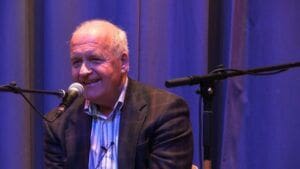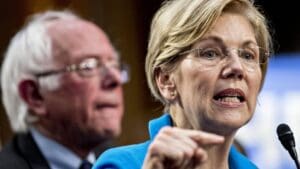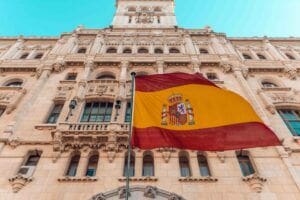Bishop: Basic income about ‘what’s right to do for people’
On May 3, the Anglican Church of Canada published a letter sent to Prime Minister Justin Trudeau calling for a guaranteed basic income (GBI) for Canadians. “Although we represent great diversity, we write to you because we are united, and morally bound in a singular message: Canada needs Guaranteed Basic Income for all,” the letter said. “We need it today.”
Signed by more than 40 Anglican and Lutheran bishops across Canada—“from the tundra of the high Arctic, the out-ports of the Atlantic coast, from French and English speaking Canada, from urban to rural, the Prairies, the Rockies and coastal mountains and from the Pacific coast”—signatories included Archbishop Linda Nicholls, primate of the Anglican Church of Canada; Archbishop Mark MacDonald, national Indigenous Anglican archbishop; and the Rev. Susan Johnson, national bishop of the Evangelical Lutheran Church in Canada.
While COVID-19 pandemic served as a spark for the letter—and is cited multiple times—the letter calls for “a new social contract, defining a new relationship amongst Canadians, through the mediating role of our government: we would be articulating a relationship where we would know, with enduring certainty, that some of our public spending would provide income for others. With GBI we state clearly and definitively that no one will be failed by the system so catastrophically that they cannot feed and house themselves and their families; that no one is left so alone and so far behind that they cannot find a path out of precarity.”
One of the letter’s key organizers was the Rt. Rev. Geoffrey Woodcroft, bishop of the diocese of Rupert’s Land. The Winnipeg-based bishop recently spoke with the Anglican Journal about the development of the letter—and why so many bishops of the church have agreed that now is the time for GBI.
The conversation has been edited for clarity and length.
How did the COVID-19 outbreak lead you to explore guaranteed basic income?
It’s actually several factors.
One was my diocesan work, in which I was having to hear daily, if not hourly, the heartbreak of Rupert’s Land Anglicans who knew that the closure of a food bank or daycare would cause hurt in the neighbourhoods around them, if we’re unable to help. All of a sudden, it became so real that these weren’t just “our ministries” — this is who we are in the world. The heartbreak of our people was very much realized by me and other leaders.
There were signals. I would get a call: “We’ve got all this food, and all these people standing outside the door, what do we do?” People would be weeping on the other end of the phone. It’s very difficult to hear that—and yet at the same time, the passion, compassion and love of God was definitely the first thing I heard through all of this.
I tried to navigate very strict protocols in response (not reaction) to the government of Manitoba’s public health protocols, while at the same time trying to challenge the Body of Christ to creativity and imagination. How else can we be the ministry, be the Body of Christ for the world? That generated a lot of email, Zooming, telephone calls and other such conversations. It was hours and hours of work just being with people and (A) hearing the anguish and (B) coming up with solutions that work.
What solutions have been working?
One really good example of this is a [faith] community that ended up engaging circus performers—like Cirque du Soleil, so acrobatic-type things—who had been using the church hall.
The church group were all over 60. Our COVID-19 protocol said, “If you’re over 60, you are not engaging in ministry face-to-face. We are here to protect your health and the health of any whom you might be talking to.” Church members were almost at their wit’s end, saying, “Well how can we provide ministry? We’re all over 60.”
“This isn’t about partisan politics. This isn’t necessarily about any political leaning.”
One person just said, “What about our partners in the circus?”
They phoned the circus. Within hours, circus members, all under 60 years of age, were able to come to the door, prepare themselves, learn the protocols, and start distributing food and building relationships again. What an amazing story.
Another group of people at a community ministry—an historic ministry shared mostly by the United Church of Canada and Anglican Church of Canada—put out the call, “We’re really hurting.”
We started to spread that message broadly. What happened next was other people on Facebook started seeing these posts, seeing the genuine concern for neighbourhoods and for those who are slipping through the cracks. This pizza parlour owner said, “Okay, I can help you. I’ll give you 110 pizzas twice a week.”
Where does this come from? The milk of human kindness, the DNA of something greater than us that’s always been there? That excited me.
How did GBI enter the picture?
At just about the same time, friends from across the country—church, non-church, ordained, non-ordained—started to have conversations. One in particular, my friend Rob James—a doctor and public health mover-and-shaker activist—contacted me directly and said, “How far can we go with this? I think we need to talk about guaranteed basic income.”
He turned me onto a couple names. One happened to be in Winnipeg, and that’s Dr. Evelyn Forget in the University of Manitoba, a health economist. Her claim to fame is that much of her work has been in the understanding, reading about and piecing together of the Mincome [Manitoba Basic Income Experiment] project of the ’70s in Manitoba, held largely in Dauphin but also in parts of Winnipeg.
The work—I believe it’s 1,800 boxes of data—showed the initial Mincome program, which was the forerunner of GBI, had done phenomenal work in relieving poverty, setting-up people for success, and pulling down unemployment.
She is great, and she has communicated with me regularly. This isn’t let’s do a project, petition the PM and walk away. This is a very clear area where God is calling me, and her career is calling her, to be caring for people in this world, and especially in our neighbourhoods.
“We are that which clothes. We are that which feeds. We are that which relieves some of the worry so people can live and have life abundantly.”
The other person I exchanged emails with was Dr. Jim Dunn out of McMaster University in Hamilton. In his work, he was part of the assessment of data from the Ontario Basic Income Pilot project. Regardless of it being shut down, it started to give data quickly. He was saying it was exciting, but he also suggested the sudden closing of the program [would make results] inconclusive, and that it was also going to throw into disarray those impoverished people who were budgeting [on the program] for three years. I later found out from the bishop of Niagara that this was the truth—she knows some of the people who were in the program who were cast out in a moment’s notice.
Dunn put me onto the writings of Hugh Segal. So I went back to my friend, Rob James, and I was talking with him about this. And I said “You know, I’m going to test the waters.” So I sent out a query to bishops in my area, people who I thought would be open to these ideas of guaranteed basic income.
What was the response like?
I was getting some really good feedback: “Let me learn more,” “I need to learn more before I speak to my people.” I said, “Absolutely.” Edmonton was one of the first on board. Why is that? Bishop Jane Alexander has been working at ending poverty in the city and elsewhere for her entire incumbency. This is a conversation that is clearly in the church.
I did read Hugh Segal’s book, Bootstraps Need Boots. As I read the book, it stirred thoughts and memories within me. He’s writing about a time and place that I grew up in, in southern Ontario. My dad actually worked as a volunteer elections worker on several campaigns for Progressive Conservatives in Ontario—especially provincial elections with Bill Davis.
I had no idea how much the PCs were movers and shakers toward ending poverty and bringing in something like the GBI. And yet they were.
Here I am reading Segal’s book and thinking: Oh my God, this isn’t about partisan politics. This isn’t necessarily about any political leaning. This is about just knowing in your gut what’s right to do for people.
And then are those things experienced in Dauphin that I’m reading about: lessening the strain on the medical system so it can actually become more proficient and more cost-saving; relieving correctional systems; relieving welfare systems that weren’t making it anywhere; relieving education systems and making appropriate strides, for if you’ve got a kid who’s fed in the morning there’s a good chance that kid might learn something in the day because they’re not distracted. All of this was exciting me, and Segal’s book touched on a lot of that.
I said to Rob, “This is amazing. It was transforming.” He said, “I’m connected to Hugh. How about I call him and see if I get a meeting with him and the bishops?”
So this is where the project became national in scope?
Yes. I got in touch with the primate. She was supportive and invited me to carry this forward. I then contacted the House of Bishops.
For the meeting, we had almost a full house, including leaders in the United Church of Canada; one archbishop of the Roman Catholic archdiocese of St. Boniface in Winnipeg; Lutheran Bishop Jason Zinko, with whom I share an office; and National Bishop of the Evangelical Lutheran Church in Canada Susan Johnson. Quite a collection of people.
What was the meeting like?
It was high energy. It was overwhelming. It was lively. Hugh was dynamic and spoke very, very well, and handled questions very well. And what I heard—and I believe to be the truth—was that everyone in that room was hearing what they needed to hear to push them to that point to say, “I think this is really good, and we need to go here.”
When we came away from the meeting, I had left people with a draft letter, which I knew was going to go through many revisions—and thank you to [General Synod staff members] Brian Bukowski and Ryan Weston for some very good corrections that were made. It was probably through 25 drafts and through the wringer before we came up with a letter that most bishops could sign. Many bishops have signed on.
In the beginning phases of writing, I approached two colleagues: one a doctor of philosophy and one a doctor of economics, both Anglican priests.
How was the letter theologically informed?
There are theological underpinnings in all of this. I was actually really touched this morning reading Psalm 41—a beautiful piece on what God thinks care of humans is: justice and loving-kindness. Moving through all the psalms and seeing where justice and kindness have kissed each other.
“So if we’re the Body of Christ and we see Christ in all people, then we have a capacity to teach a new social contract.”
In writing the letter, I worked with the text from the end of the Sermon on the Mount from Matthew 6, where Jesus says to the crowds, in front of the disciples: Think of the lilies of the field. Think of this beauty of creation—what God has done to clothe and feed all of that. Now think of you: you who are worrying about what to wear, what to eat, what to expect this day. Do any of you add a moment to your life by worry?
As I read through that several times, I thought, “Yes, I am called to look at this further and further. God is speaking to me through this, God is speaking to the church through this.” We are that. We are that which clothes. We are that which feeds. We are that which relieves some of the worry so people can live and have life abundantly. That’s where I’m at.
The letter notes that GBI would be a new social contract. I’m wondering what about the present COVID-19 moment, to you, indicates our need for a new social contract? And how should the church be calling people to that table?
You’ll also notice in that paragraph that it talks about this is who we are as Canadians, not who the government is. The contract is more about our relationships than it is about rights and responsibilities. It’s more about our identity. The church has a gift in that it understands itself as a collective identity. Sometimes we don’t do it so well, but for much of the time we’re actually really good at being the Body of Christ. I see us in this realm much like Ken Leech.
Kenneth Leech was a pastor-priest from St. Botolph’s in East Gate (Aldgate), London. He was always a good writer on prayer and activism. Nearing the end of his career at St. Botolph’s, he wrote a book called Subversive Orthodoxy. He taught clearly about the role that the church plays, especially in neighbourhood settings, and especially in places where there is poverty, racism and social ill. He talks about the church being a place of hospitals: how you bring people in, how you draw them without judgment, how you make a home for people no matter what. And it’s in the face of the problems that you’re doing it.
Then, as you gain that comfort level of people—there’s a sense of prayer, and after that there’s a sense of politic. Because you’ve come to a place where you’ve built relationships and you’re ready to do some work. That work in East Gate was largely about bringing adequate water supplies to the community, making sure sewage was handled properly—a number of actual physical issues. In our case, what I have seen through COVID-19 has been a sort of rich warming of people’s hearts to the point that they want to get on to do something, even at a distance. I hear more people saying “good morning” on a walks than I did before the COVID crisis. There’s something that’s changing— something that motivates people to a change.
What was that? And why was that? The church, who gets these things because of our identity and because of the DNA of Jesus that enables us to see the bigger picture and consider the lilies—or how about this, to be walking in the marketplace knowing someone’s going to touch the robe—it is we who actually have gifts for the world. The church might teach our neighbourhoods what it is to be in right relationships with other people—because we believe the fourth strategy of baptism: to seek and serve Christ in all people. When we believe that, we’re actually doing something not because we’re commanded to but because we are it.
So if we’re the Body of Christ and we see Christ in all people, then we have a capacity to teach a new social contract. If we look at our Church history regarding GBI in Canada, it’s like this: through some of the really hard things that the country has gone through, including colonization, we have somehow slowly grown to do things that are better for all people. If we look at health care as just being one, possibly the strongest one, that’s a place where you see a response from a whole country that says, “We need to do this.” In our case right now, where we’re worried about hate, where we’re worried about and for southern neighbours, where we know we most definitely have to support the self-determination and care of Indigenous persons across this land—we have the capacity and the ability to do this work peaceably and do it really, really well.
It strikes me that a curiosity about Canada is that it sometimes holds in tension its inclinations towards bureaucracy—to come up with the appropriate entitlement programs to determine fairly or as fairly as possible who shall receive what, who is entitled to what benefit—and then also, this other narrative in Canada that we see in someone like Tommy Douglas, where that is set aside to say, “Actually, all people are entitled to this. All people have a seat at this table.” And that this is not a question of finding a means-tested solution but rather, an introduction of God’s economy into our work.
Yeah, God’s economy. Right on. And I’m going to say: a relationship-based economy in which we value all human beings. And that we believe that all human beings bring something really special to their relationships.
Do you think one of the effects of COVID-19 is that we’re really reflecting on our relationships in ways that we haven’t, perhaps, in a very long time?
Yes. First, there’s a much more intentional desire to focus on relationships. Perhaps we have been taking for granted our relationships?
We have always valued relationships. I’m not sure we have always valued them to the fullest extent. In that respect, I’m looking at parishes that have come alive because of their weekly phone tree. In some cases, twice a week people are in these conversations. People who really didn’t know one another are talking, and they’re able to talk about COVID-19—but they’re also able to talk about the church and things we could be doing. Talking about missing the Eucharist. Talking about missing coffee hours. Then all of a sudden, we have Zoom coffee hours.
The beauty is that these relationships, I think, are hugely sustainable but also critical for the Body of Christ to maintain this notion that it continually needs to re-envisage its identity as one body. That’s really hard for folk in a world that is largely compartmentalized or individualized or me-first or consumer-oriented.
The church has issued many letters. Sometimes it issues letters and walks away, and sometimes it issues letters and sticks with them and continues to advocate. What are the next steps for you?
A quick study of our Anglican Church history will reveal that all I’m doing is one of the next steps from our church leaders from the 1970s. From 1973—where it first began to be discussed—and right through the ’77 General Synod, this church strongly advocated for guaranteed annual income (I believe that was the citing in the General Synod notes). So this is a logical and recognizable next step on its own.
In terms of next steps Anglicans can take, a template is available on Rupert’s Land’s website—a letter that individuals may send to their MPs and flood inboxes and snail-mail boxes. The template can be printed and snail-mailed, which is actually preferred in many cases in local constituency offices. There are instructions with the letter on how best to make that appeal so it will be read. And there’s an email template as well.
The next action for me: I really would like to gather Segal, Forget and possibly Dunn onto a webinar and just help people who might be struggling with the concept. Sometimes you can know in your heart that guaranteed basic income is a good thing, but it can be hard to get your head around it.






















